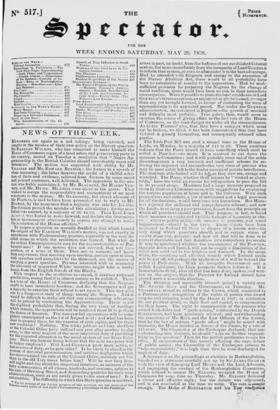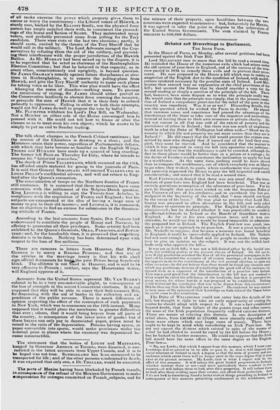NEWS OF THE WEEK.
MINISTERS are again in a sad taking; being outvoted, and caught in the meshes of their own poliey on the Slavery question. Sir EARDLEY WILMOT, who has contrived to make himself the House of Commons organ of a most active and perseverinte party in the country, moved on Tuesday a resolution that " Negro Ap- prenticeship in the British Colonies should immediately cease and determine. The motion was supported with ability by Mr. Vieenits and Mr. EDWARD BULWER the former in a speech of close reasoning ; the latter deserves the credit of a skilful selec- tion of facts and evidence, relieved from dryness by some smart and pointed sentences, well delivered. The opposition to the mo- tion was feebly maintained, by Mr. BLACKETT, Sir HARRY VER- NET, and Mr. IlumE. Ministers were silent as the grave. They wished to escape the responsibility and unpopularity of an open resistance to the motion. Mr. GLAG4TONE, the clever advocate of the Plaeters, is said to have been persuaded not to reply to Mr. BULWER, by the assurance that a majority was safe for his tide. The division proved the mistake of this calculation ; for the reso- lution was carried, by a majority of 06 to 93. Then Lord JOHN linhtit.I. was forced to come forward, and declare the determina- tion or Goveininent strenuously to oppose any attempt to make the resolution of the House effective.* To reopen a question so recently decided as that which formed the subject of Sir Eminent. Winerofs motion, was not exactly in accordance with Parliamentary practice, especially in the very de- cided terms in which the resolution was framed. But what do the ardent Emancipationists care for the conventionalities of Par- liament-men? If one motion does not succeed, they will Lave another, or a score of them. They are in earnest; and know from experience, that meeting upon meeting, motion upon metion, with speeches and pamphlets by the thousand, are the means of carrying a great question. Persons intrusted with or assuming the advocacy of important White interests, might take a useful lesson from the English friends of the Blacks.
With respect to the resolution as carried, it involves awkward possibilities, seeing that it is almost certain to be nullified. There Is a vote of the House of Commons declaring that the Negroes ought to have immediate freedom; and the Govermnent will get a majority to sanction their- refusal to act upon it. This ma v give rise to a dangerous state of things among the Negroes. And it would be difficult to make out that any compensating advantage will be trained by continuing the Apprenticeship. There is not the sliglitest probability that, during the two years of bondage which remain, the apprentices will be rendered more fit to perform the duties of freemen. The non-prredial apprentices will be com- pletely emancipated on the 1st of August next : and what has been done to prepare them for the exercise of civic rights, and for their new condition ? Nothing. The tricky jobbers and lazy shatters at the Colonial Office have suffered one year after another to slip away, in the utter neglect of the most important duty of providing for the expected alteration in the social system of our Slave Colo- nies. Dues any human being believe that the next two years will be better employed ? Will Lord GLENEma grew more active, or less evasive of duty, as he gets older ? Is he likely to abandon the System of deceitful procrastination and reckless negligence which las characterized his rule at the Colonial Office, certainly not less than in the old Tory times before him? Will be now busy him- !elf night and day about his important functions, as autocrat of the forty communities, of all climes, kindreds, and customs, subject to tbe rule of Downing Street, and demanding qualities for their wise administration, such as are rarely given to the sons of men? It is not credible. The difficulty in which this Slave question is involved,
For all account of the farther progress of this question. see our analysis of the vektes, and a Lotice of last night's Parliamentary proceedings in the Postscript.
arises in part, no doubt, from the badness of our established Colonial system, but more immediately from the incapacity of Lord G LENELGF to reform that system, or even to administer it to the best advantage. Had he attended with diligence and energy to the execution of the Slavery Abolition Act, there would in all probability have been no complaints of cruelty to the apprentices. Had he made sufficient provision fur preparing the Negroes for the change of social condition, there would have been no risk in their immediate emancipation. Were it possible to place the least confidence in Lord GLENELG'S future exert ions, an argument inght be framed, stronger than any yet brought forward, in favour of continuing the term of apprenticeship to its appointed period. But under the GLENELG administration, improvement is hopeless—the growth of mischief and difficulty most probable. True police., then, would seem to sanction the course of giving effect to the last vote of the House of Commons, as the least dang,ereus under all the circumstances. As to the Planters' plea, that they have a compact which must rot be broken, we think it has been demonstrated that they have violated it grossly themselves, and consequently released other parties.
The Irish Poor Bill was read a second time in the House of
Lords, on Monday, by a majority of 149 to '20. These numbers indicate that the Peers intend to have something which shall be called a Poor-law—no more. It is resolved to cut down the measure in Committee ; and it will probably come out of the noble dissecting-room a very innocent and inefficient scheme for re- lieving the impotent and maimed—the very class of persons who may be most safely left to the tender mercies of private beneficence. The destitute able-bodied will be leilsas they now are, savage and wretched. The Peers, whether thetr7intents be " wicked or chari- table," have too valid an excuse for indisposition to pass the bill in its present shape. Ministers had a large measure proposed to them by their own Commissioners, with suggestions for employing the surplus population at home and in the Colonies. With such preparatives and outlets, a law of settlement and a legal provision for all the destitute, would have been less hazardous. But Minis- ters rejected the sufficient and comprehensive scheme; and now the Lords, in making a poor-provision, depart from the principle on which all poor-laws should rest. They propose, in fact, to found their measure en vague and variable feelings of humanity or cha- rit; whereas public utility—ths eecuritY er property, a ed social improvement—should be the L301. These nhjects have been neglected in Ireland till there is flinger of a servile war—the very thing which poor-laws should, and in certain states of society alone can, prevent : and now all that will be done is to convert charitable and free donatioas into compulsory payments. It may be questioned whether the consequence of the Poor-law, thus cut down and limited, will not be simply a diminution of the relief now rendered to t'se helpless and diseased. In the mean while, the searching and elliettual remedy which Ireland needs will be put off, till perhaps the application of it will be beyond the power of Parliament. With an incapable Government and a
selfish Legislature, the Irish prospects darken before us. It is lamentable to think, after all that has been done, spoken, and writ- ten on the subject, that the Poor-law for Ireland should have proved such a miserable abortion.
The shipping and mercantile interest gained a victory over Mr. SPRING RICE and the Government, on Thursday. Mr. CREsswess moved an address to the Crown, which amounted to a Parliamentary recognition of the rights of parties who owned cargoes and shipping seized by the Danes in 1807, in retaliation for our piratical attack on their fleet and capital, to compensation for their losses. The right to compensation of the persons who owned b ok-debts and " goods ashore," confiscated by the Danish Government, had been previously allowed; and notwithstanding the assertions of Mr. RICE and the Law Officers of the Crown, that by the law of nations " goods afloat" might be seized with impunity, the House decided in favour of the claims, by a vote of 115 to 81. The Chancellor of the Exchequer declared, that not- withstanding this decision, he should " take no further responsi- bility on the question." Then let the pettish gentleman resign his office. If on questions of this nature, affecting the expenditure of public money, the Chancellor of the Exchequer refuses to "take responsibility," it is high time that he were discharged for neglect of duty.
A discussien on the proceedings at elections in Roxburghshire,
founded on a statement carefully got up by Sir JAMES Gamiest with the view of' dam leiter Lord MINTO and the Lord Advocate, and impugning the conduct of the Rexburghshire Committee, which refused to unseat Mr. Esstorr, occupied the House of Commons for some time on Thursday. Mr. ELLIOTT delivered a clever and effective reply; but the debate was adjourned, and is not concluded at the time we write. The case is.imple enough. The Duke of Bucctsvcu and his Tcry 600)4110ra .,f of all ranks exercise the power which property gives them to coerce or worry the constituency : the Liberal voters of Hdwick, a sturdy race, backed by the ELLIOTT family, use the physical force nature has amply supplied them with, to counteract the proceed- ings of the house and faction of Scorr. They maletreated many Voters, and probably prevented some from polling for the Tory candidate. There were riots at the last two elections ; partly, it should seem, excited by the threats of the Tory Sheriff that he would call in the military. The Lord Advocate enraged the Con- servatives by refusing them the aid of the soldiery, and prevent- ing their interference with the proper jurisdiction of the Hawick Bellies. As Mr. MURRAY had been mixed up in the dispute, it is to be regretted that he acted as chairman of the Roxburghshire Election Committee; but that he behaved in that capacity, as in every other, conscientiously and uprightly, is beyond question. Sir JAMES GRAHAM'S remedy against future disturbances at elec- tions in Roxburghshire, is to remove the polling-place from Hawick, and give the Tory Sheriff authority to name such places for taking votes as he likes. This wise plan would have the effect fehanging the scene of disorder—nothing more. To prevent the recurrence of rioting, Sir JAMES should either prevail on the Conservative landlords to abstain from coercing the tenantry, or persuade the men of Hawiek that it is their duty to submit patiently to oppression. Failing in. either or both these attempts, would not Sir JAMES do well to propose the vote by ballot ? Mr. PLUMPTRE withdrew his Lord's Day Bill, on Wednesday. Not a Member on either side of the House encouraged him to proceed with it. He could not tell how to frame or alter the clauses so as to meet even his own object; which he avows to be simply to put an end to Sunday trading.



























